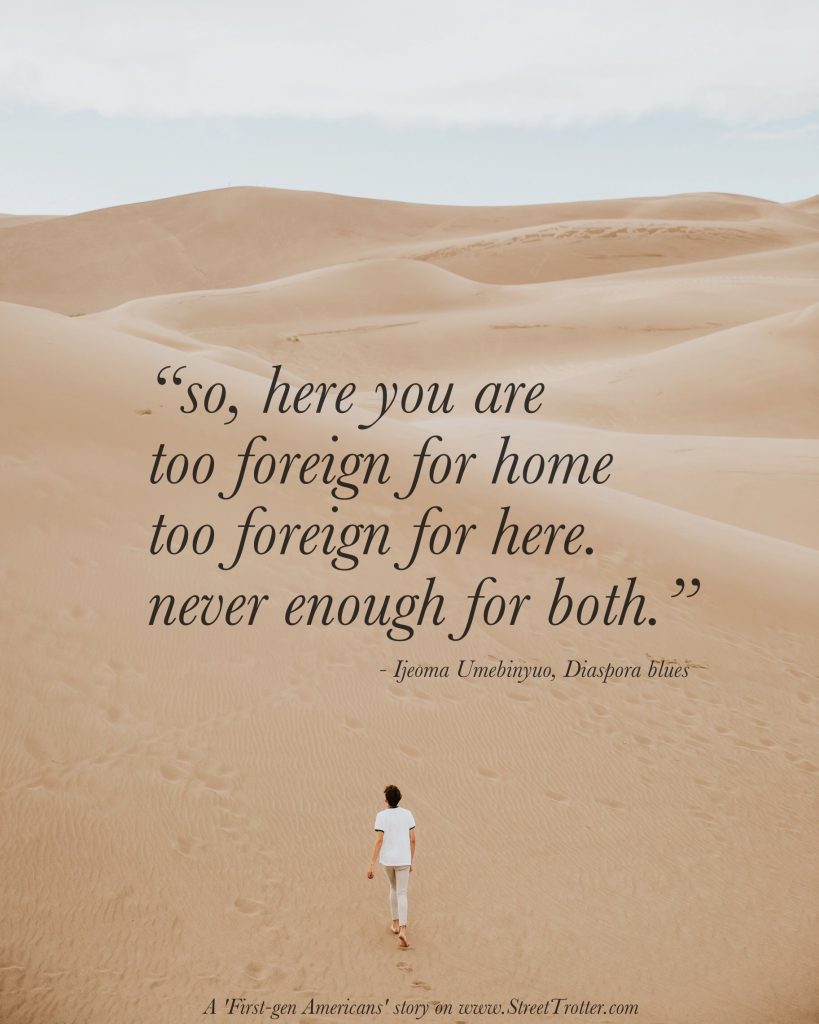Three out of four of my grandparents were immigrants. They came from Scotland and Spain, on long, grueling journeys spurred by poverty and civil war. They grounded lives for their children out of mailroom and factory jobs.
Two generations later, I grew up comfortably, as middle-class American as we could be, far removed from the countries my grandparents left behind. I don’t straddle the cultural gap that first-generation American kids do. And to try to understand it better, I interviewed three of my friends, all first-generation Americans, who know that gap well.
Sreeja was born in India, and her parents left her there with her grandmother for a year while they set up a life in the US. Zhenya’s parents left Russia after the fall of the Soviet Union and emigrated to Mexico, where Zhenya was born and lived until her parents picked up again and headed to New York. Eileen’s parents left China and settled in Connecticut before moving to New York City and having Eileen.

I asked Zhenya why her parents went to Mexico before heading to the United States, and she said her parents already had friends in Mexico and joined them there. Sreeja said her family did the same – they came to Massachusetts because her father’s college friends already lived there. Her father’s friends helped her parents get their start in the US, loaning them money to buy a car. Only Eileen’s parents didn’t know anyone here when they first left China. Already married, they came to the US when Eileen’s mother began attending college here.
The three of them visit their parents’ home countries pretty often. Sreeja goes back to India every other summer; Zhenya visited Russia every summer until recently, but she’s going back this winter; and Eileen goes to China every four years. Sreeja said that on her most recent visits to India, she has felt a barrier growing between her and her family there.
“When you’re young, even though you don’t know the language, it’s always easier for little kids to connect with their grandparents because it’s just having fun, running around,” she said.
Now that she’s older, cultivating that connection across language and culture is difficult.
“If I try to talk to relatives about news, not only is it a different country-mentality, it’s also like, ‘This is our little granddaughter, why is she talking to us about these adult issues?’” she said.
Later during our conversation, Zhenya expressed the same feeling. She also felt a divide growing between her and Russia.
“I can feel my Russian slipping away from me,” she said. “Even though I talk to my parents in Russian and talk to everybody from Russia in Russian, obviously, it’s still dwindling.”
Eileen agreed with Zhenya. She said that before she visited China this summer, she felt like she needed to brush up on her Chinese, “Just to be more connected.” Eileen doesn’t know how she would bond with her grandparents if she couldn’t communicate with them.
So for these three women, language is of utmost importance when fitting into their families’ countries of origin. But “fitting in” involves much more than language proficiency. When Sreeja, Zhenya, and Eileen visit family abroad, they are all aware of how much they stick out as Americans.
There are subtle differences, as well as clear ones. Zhenya talked about how Russians have sterner facial expressions than Americans, but clothes make the most obvious tells. All three agreed that strappy tank tops and shorts are a dead giveaway. They had horror stories: the time Sreeja’s mother made her and her family wear sneakers on what was supposed to be a barefoot pilgrimage in Tirupati, India, or when Zhenya wore short-shorts to tour a Russian Orthodox Church and an old woman, disgusted by her outfit, made her put on a long black skirt.
American-ness isn’t just about shorts-wearing and sneaker-walking, though. Once again, sense of belonging seems to come down to language, which makes being a tourist in English-speaking areas somewhat of a comfort for Sreeja and Eileen. Sreeja told the story of a trip her family took to the Taj Mahal, one of the most famous tourist destinations in the world.
“I could speak in English comfortably because all the tour guides would speak in English to me, and they knew we were American,” she said. “And then you go home, you go down to your grandparents’ house, and it’s just a completely different attitude. You do different things, and you have to try and speak in a different language.”
When I asked her if she was more comfortable being a tourist in India than in her family home there, she said, “I thought so. But I mean, there are comforts to both things.”
Eileen was more unequivocal about it. She said that when she’s in Shanghai, she feels more comfortable in international, touristy areas.
Zhenya differed the most on this point, for two reasons. For one, she went to elementary school in Russia, so she’s spent significant periods of formative time in her parents’ home country, unlike Eileen or Sreeja. As a result, she said she’s more “in” culturally, although she said she can feel herself “slipping out.” Plus, she said that Russians love being tourists in their own country, so tourist areas aren’t as flooded with internationals.
After the interview ended, Eileen asked me to turn the recorder back on for one more comment.
She told the story of how this summer, when she went to Shanghai, she felt touched when she got the chance to counsel a younger cousin about college. Similarly, Sreeja said that she valued the time she got to spend playing with her little cousins in India. Eileen summarized her trips home: “Good family, good food, good times.”
First-generation American problems notwithstanding.
About the Author: Miranda Suarez is our in-house Assistant-Editor, a journalism student and a wannabe Travel Channel host. She appreciates good books and road trips with well-curated soundtracks. (If you have any music recommendations for a long car ride, she’d love to hear them.) Connect with her on Twitter!
To read more about communicating far away from home, check out Embrace and embarrassment — A Travel Story By Mirada Suarez.








nice post. Thanks for sharing.
What a lovely piece of writing ! I loved all the three characters and their perspectives. Yes, it’s difficult to adjust to everything back home and somewhere we tend to think that we are slipping to be outsiders.
Thanks for sharing this.